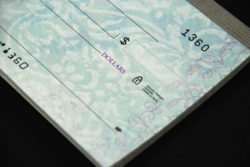Top Class Actions’s website and social media posts use affiliate links. If you make a purchase using such links, we may receive a commission, but it will not result in any additional charges to you. Please review our Affiliate Link Disclosure for more information.

Many customers of California’s Educational Employees Credit Union (EECU) have reported that their credit union’s overdraft fees are a problem. This problem is felt more keenly by those of low to low-moderate incomes.
When a credit union overdraft fee is placed on an account, it drives the account’s balance farther below zero. If a low income patron must draw on their next paycheck to bring their account into good standing, this takes away funds that may be needed to purchase basic necessities until the next time they get paid. This can start a vicious circle of debt that is difficult to get out from underneath.
Many financial institutions claim that in order to avoid a bank or credit union overdraft fee, a customer only needs to keep a careful watch and log their deposits and daily debit card, and ATM withdrawals. Knowing precisely when an Automated Clearing House (ACH) transaction is expected to present to bank is also helpful. According to PayPal, an ACH is an authorized debit payment from your account such as a mortgage or car payment.
As additional backup, these financial institutions often present new customers with all sorts of bank and credit union overdraft protection plans. By offering you these plans, the organization is actually protecting itself.
For nearly nine years, it has been illegal to charge an overdraft fee unless a customer “opts-in” or says yes to one of these plans. That isn’t to say that that such programs are unhelpful. At times, they can keep a miscalculation from turning into a bigger disaster if they allow the patron to avoid a returned item fee from the presenter of the debit for each transaction. That can be a stinging double-whammy to someone’s pocketbook.
According to the credit union overdraft options sheet provided by EECU, a customer can choose from three options. The first option allows money to be automatically transferred from an associated savings account to cover a non-sufficient fund (NSF) transaction for a fee. The second option is to establish an ongoing loan with the credit union that will cover you if you need it and charge you interest until the balance is paid.
The final option is to enroll in the Platinum Overdraft plan where items will, within certain parameters, be paid by the bank despite insufficient funds but not returned to the payee, saving secondary charges. Bringing the account back into good standing is an expected part of this agreement.
Customers of EECU and other financial institutions complain that overdraft charges are assessed on available and not actual balances of accounts, however. For example, an NSF fee can be charged on an account that has a $50 actual balance after a $30 restaurant bill is authorized until the transaction clears. The available balance of $20 is then all that remains to cover a $40 check that appears later in the day. This check puts the account “in the red” and can trigger an overdraft charge.
The problem with this methodology for determining overdraft fees on the part of financial institutions like EECU is that the customer may have little to say about the order transactions are debited from an account.
Banking organizations claim that these are processed in the order they are received, but many question whether in this unseen process, larger transactions aren’t debited first to trigger an overdraft charge and maximize institutional funding.
If you were charged unfair overdraft fees by your bank or credit union, you could be eligible to participate in a FREE class action lawsuit investigation. If you qualify, an attorney will contact you to discuss the details of your potential case at no charge to you.
Fill out the form on this page now for a free, immediate, and confidential case evaluation.
ATTORNEY ADVERTISING
Top Class Actions is a Proud Member of the American Bar Association
LEGAL INFORMATION IS NOT LEGAL ADVICE
Top Class Actions Legal Statement
©2008 – 2024 Top Class Actions® LLC
Various Trademarks held by their respective owners
This website is not intended for viewing or usage by European Union citizens.
Get Help – It’s Free
Join a Free Bank Overdraft Fee Class Action Lawsuit Investigation
If your bank and credit union has engaged in deceptive overdraft fee practices, you may have a legal claim. Fill out the form on this page now to find out if you qualify!
An attorney will contact you if you qualify to discuss the details of your potential case.
PLEASE NOTE: If you want to participate in this investigation, it is imperative that you reply to the law firm if they call or email you. Failing to do so may result in you not getting signed up as a client or getting you dropped as a client.
In order to properly investigate overdraft fee claims, you may be required to disclose bank statements to overdraft fee attorneys. Please note that any such information will be kept private and confidential.












